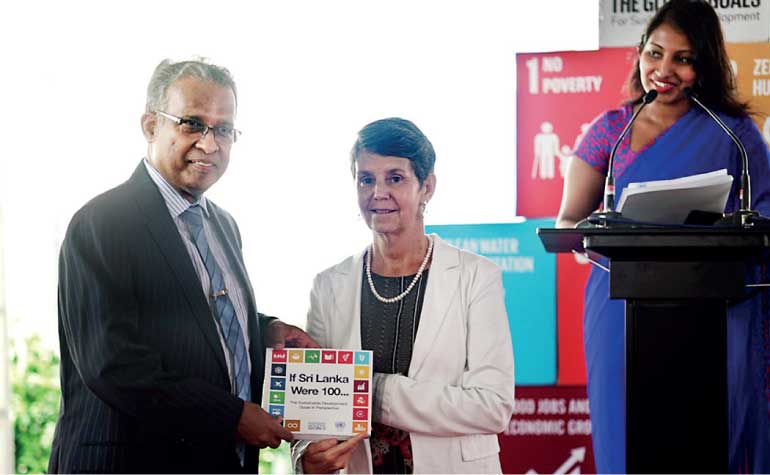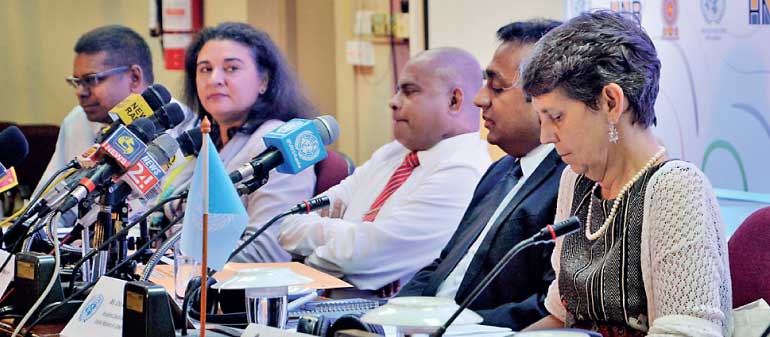Wednesday Feb 18, 2026
Wednesday Feb 18, 2026
Wednesday, 25 October 2017 00:16 - - {{hitsCtrl.values.hits}}

Ministry of Foreign Affairs Secretary Prasad Kariyawasam and UN Resident Coordinator Una McCauley
Following is the address by Foreign Secretary Prasad Kariyawasam to mark the 72nd United Nations Day
Una McCauley, UN Resident Coordinator and UNDP Representative in Sri Lanka, staff of the UN Country Team in Sri Lanka, UN volunteers, ladies and gentlemen, as the UN turns 72, Sri Lanka’s formal relationship with the United Nations turns 62.
As an officer who has served in the Foreign Service of Sri Lanka for over 30 years out of those 62 years, and served as Permanent Representative both in Geneva and in New York, and still serving as a UN Treaty Body Member, and thus serving both the UN and my country, I can confidently say that Sri Lanka’s relationship with the UN is at present, probably at the best it has ever been.
The United Nations is the organisation that we, the Member States, created, following two devastating world wars. The promise that was made in the Charter that came into effect on 24 October 1945, was to save succeeding generations from the scourge of war, and uphold instead, respect for dialogue, diplomacy, international cooperation and an international rules-based-system.
Sri Lanka, in a sense, has travelled the full-circle, locally. A country hailed as a potential Switzerland of the East at Independence in 1948, we very soon lost our way. We went from a post-Independent nation that was respected on the international stage, to one that almost forgot the values and principles that we as a nation stood for, at the time that we joined the United Nations.
Having almost driven ourselves to self-isolation, the people of our nation once again took destiny into their hands, and took the bold step, through democratic means, on 8 January 2015, to bring our nation back from the depths of isolation onto respectability on the international stage. Shedding divisive practices, and futile arguments that we were engaged in with the international community, we stood up once again with confidence to take responsibility for all our citizens, and to recommit to upholding the values and principles enshrined in the Charter of the United Nations.
Just nine months later, when the United Nations turned 70, the President, the Prime Minister, the Leader of Opposition, the Speaker of Parliament, and Members of Parliament from different parties, all walked into this compound and joined hands with all of you, the United Nations family in Sri Lanka, to celebrate the United Nations, and to celebrate 60 years of our Membership in the United Nations.
This is the spirit with which we continue to honour the United Nations Organisation and its work. This is the spirit with which we continue to engage with the United Nations, and its systems and procedures.
The United Nations exists and works for “We the Peoples”. It has been in the forefront in drawing attention to the greatest problems faced by mankind. It has helped lift populations across the world out of poverty. It has helped promote democracy, and make the world safer for children, women, and the vulnerable. It has helped draw communities across the world, closer, and it has helped build strong partnerships and forge greater ties.
Of course, the challenges before us in the world seem daunting. Effects of climate change, conflict, refugees, rise of violent extremism and intolerance, threats to human rights, terrorism. We see “we the people” suffer as a result of these human-made phenomena on a daily basis around the world. Yes, these do pose considerable challenges.
Yet, it is my firm belief that no matter how hard it may seem, or how challenging it may be, it is by upholding the values upon which the United Nations was founded – pluralism, human rights, respect for diversity, and the principle of working together – that we can overcome the problems that the world is faced with.
Ladies and gentlemen, Secretary-General António Guterres, as Una mentioned, is a man of few words. But his few words are always very moving and meaningful. In his toast to the Heads of State and Government during the UN General Assembly this year, he said that “History strongly depends on the individual actions of each one of us.”
Of course, he was speaking to a room packed with world leaders. But, as you all know, the United Nations is made up of “We the Peoples”. This includes all – those who may be world leaders and others. Some may believe that it is only the world leaders that can make a difference. But I firmly believe that each and every one of us, “We the People”, can do much in our own individual way, with determination, to influence history, one step at a time, by our everyday actions, by how we support a greener planet and blue ocean, through small decisions in our everyday lives, by embracing non-violence, by embracing dialogue over conflict, by promoting greater understanding among all, by recognising the interconnected nature of all life and all things, by reaching out to other human beings who may seem different just because they speak a different language or have a different set of beliefs, but are “human” and that “humanity” unites all of us, and by imparting values and principles to our children who are the most important in our lives. Ladies and gentlemen, I believe that none of us as individuals are too small, too insignificant, or too weak to change things for the better. If we are determined, we can make a positive impact.
And the United Nations must take the lead to create awareness among people and inspire people that we are ultimately one human family, and that we must work together for the benefit of all.
Ladies and gentlemen, we in Government value the work of the United Nations in Sri Lanka. The support that all of you provide us at this important time in our country’s history, is invaluable. I thank all of you in the UN Country Team in Sri Lanka for the dedication and commitment with which all of you work to support us in every conceivable field of importance to us, in our quest of pursuing the goals of strengthening our democracy, forging reconciliation, ensuring equitable and inclusive economic development, and sustaining peace.
While thanking all of you, I also want to extend appreciation to the entire UN family across the world, including the UN Peacekeepers who so selflessly devote their lives to promoting international peace and security, development, combating disease, eradicating poverty and building a stronger United Nations with the aim of creating a better tomorrow for us all.
Thank you.
UN and Ministry of Education launch SDG Action Campaign
The United Nations and the Ministry of Education, in partnership with Hatton National Bank launched the ‘SDG Action Campaign’ at a press conference held in Colombo yesterday.
In 2015, countries adopted a set of Sustainable Development Goals to end poverty, protect the planet, and ensure prosperity for all as part of a new sustainable development agenda. Each goal has specific targets to be achieved by 2030.

For the goals to be reached, everyone needs to do their part: governments, the private sector, civil society and people.
Hence this year, in celebration of the 72nd UN Day, the United Nations in Sri Lanka and the Ministry of Education in partnership with Hatton National Bank and Roar media, have come together to launch the ‘SDG Action Campaign’ – a campaign to educate and encourage students from across the country to design and implement an SDG based project in their communities.
Addressing the media, Minister of Education Akila Viraj Kariyawasam stated that “Education is the key that will allow many other SDGs to be achieved, this campaign will educate and empower the youth of Sri Lanka to help the country progress.”
Highlighting the importance of youth in achieving the 2030 Development Agenda, UN Resident Coordinator and UNDP Resident Representative Sri Lanka Una McCauley stated, “We need Sri Lanka’s youth to be actively engaged as sustainable development leaders if we are to achieve the SDGs by 2030.” This campaign will support student-led initiatives towards achieving the SDGs in Sri Lanka by educating students on the SDGs, calling for project proposals and empowering 25 selected school projects across the island with seed funding and mentoring to kick start their sustainability projects.
Speaking about the partnership and on the funding of this campaign, Hatton National Bank Chief Operating Officer Dilshan Rodrigo stated: “HNB has played a vital role in inculcating a savings habit among children over the years and has over 200 active school units around the country. HNB’s strategy is aligned with the national vision to improve banking penetration, develop the rural/green economy whilst reducing the informal sector. To this end we have been a forerunner in driving digital banking, green buildings, paperless offices congruent with UN’s Sustainable Development Goals. We are delighted to be associated with this project as the exclusive banking partner.”
This campaign will mobilise Sri Lanka’s youth to advocate and work towards the SDGs and in doing so, inspire their communities to work in partnership to build our future and achieve the SDGs for people, planet and prosperity in Sri Lanka.